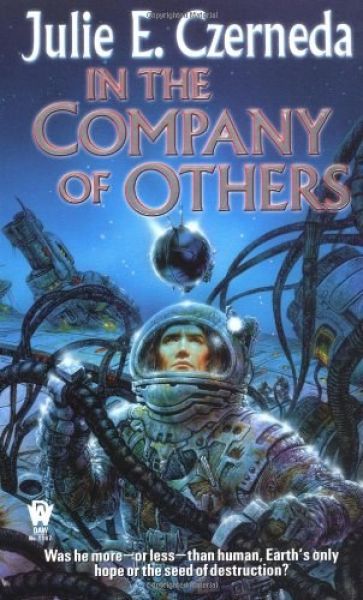Inch By Inch, Row By Row
In the Company of Others
By Julia E. Czerneda

17 Feb, 2017
A Year of Waterloo Region Speculative Fiction
0 comments
To quote Julie E. Czerneda’s online bio:
Julie Czerneda is a Canadian author and editor whose first novel, A Thousand Words for Stranger, was published in 1997 by DAW Books. Since then, Julie has produced over a dozen more novels, edited fifteen anthologies, and written numerous short stories. Her work has won awards, consistently made bestseller lists, and garnered praise from readers and reviewers around the world.
As noted that same bio, Czerneda was a student at the University of Waterloo and thus she is fodder for A Year of Waterloo Region Speculative Fiction.
Czerneda’s 2001 Aurora Award-winner In the Company of Others is a stand-alone science fiction novel.
Interstellar exploration turned up dozens of worlds suitable for human occupation, given some well-thought-out terraforming. All that stands between humanity and endless frontiers is a bit of time, some ingenuity, will, and applied technology.
And the Quill. But the Quill on their own are enough to bring the space colonization effort to a sudden halt.
Seemingly harmless alien lifeforms, the Quill were inadvertently introduced to all of the terraformed worlds by researchers using them as personal decoration. When the Quill suddenly turned lethal, none of the colony worlds were spared. Any human exposed to the Quill Effect died and since nobody had any idea how to block the Effect, all humans on the terraformed worlds were exposed to it. Only would-be colonists still in space were spared.
Earth barred extra-Solar colonists from returning to the Solar System, lest one of the returnees bring the Quill with them. Ships trying to break the blockade are destroyed. This means the colonists must choose between immediate death by starship weapon or a lingering death as they try to stay alive in ships and space stations not intended to keep such a large population alive for so long. Most have chosen the latter; perhaps the horse will learn to sing.
Equipment used beyond its service lifetime is breaking down. Time is running out for the would-be colonists.
Dr. Gail Smith thinks she may be on the trail of a solution to the Quill Effect. To test her theory, she needs to find Aaron Pardell, descendent of the woman widely blamed for spreading the Quill in the first place and the only human known to have survived on the surface of a Quill-infested world.
Aaron is not interested in being a guinea pig but he is not going to get a choice.
~oOo~
The negative first: the romance plot just didn’t work for me. The other relationships, yes, but the love affair felt forced.
One way to measure Czerneda’s on-going popularity is simple page length. Back in 2003, Borders and Barnes and Noble determined that mid-list science fiction longer than 120,000 did not sell in numbers worth stocking, so they abruptly stopped buying long SF (if you noticed a lot of duologies around 2003, that would be why). While Czerneda does not write Peter Hamiltonian tomes, her books do have definite heft: Company is almost 600 pages. The fact her books still clock in above the 120,000 word limit show she has escaped the mid-list.
This is a universe where interstellar travel is easy but unwise: while the characters make great progress towards accommodation with the Quill, the fact the humans ran into it so early in their exploration of interstellar space suggests exceedingly dangerous lifeforms are common.
While it makes sense humans avoid the worlds with complex ecosystems because those are the sort that conceal surprises like the Quill, it seems odd that there would be so many worlds that need only a few decades of work to prepare for human occupation. While insta-terraforming is an established trope in SF, Czerneda’s background is in biology and I would expect she’d know better than to think transforming entire worlds would be fast. My head-canon is that the worlds humans decided to colonize were the ones with life in the ocean but not on land. I would expect such worlds to be common. Earth has had life for over four billion years but land life for only the last few hundred million.
It would nice to denounce the invasive species plot as implausible but one could argue introducing new species with no local predators and then being astounded as yet again the invasive species rapidly colonizes its new home is a characteristic human activity, whether its Argentinians unleashing beavers on helpless Tierra del Fuego or Ontarians endangering forests with alien earthworms. Or a nameless someone transporting sweet potatoes from the New World to the Old.
Punishing victims of calamities is also very nearly as universal a human characteristic as bilateral symmetry. Earth in this case at least has the excuse that they really do seem to face an existential threat from the Quill, one made much worse by the fact the Quill’s curious biology makes it very hard to detect. At least Earth does not seem particular spiteful about consigning the colonists to slow death.
Although the causes are very different, the clash between people trapped on slowly degrading starships and the station personnel terrified that their station’s limited resources will collapse under a wave of refugees brought to mind a particular Hugo-winning novel, also from DAW.

There’s no ongoing war but the lack of resources gives rise to a similar feeling of desperation.
A nice page-turner, In the Company of Others is available here (Amazon) and here (Kobo).
Please direct corrections to jdnicoll at panix dot com
